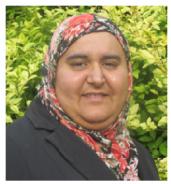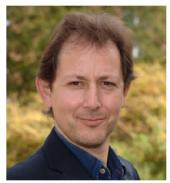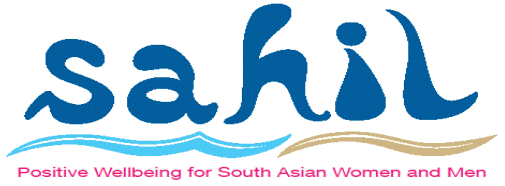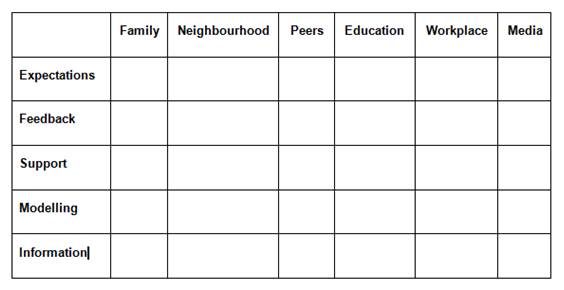The Sahil Project: Career Learning in a Safe Haven
The Sahil Project, based in Coventry, provides a range of practical and emotional support for women from black minority communities especially from the Asian sub-continent. Shaheen Akhtar, in conversation with Phil McCash, discusses her plans for helping these women develop their careers as part of her MA in Career Development and Coaching Studies .
.
Shaheen: I am designing a career education programme for Asian women who have never worked in a paid setting or have not worked in paid settings for a while. The women range from being first generation to fourth generation immigrants. Most of their learning is community-based and they are more likely to have learnt about careers in wider social or cultural contexts. Each woman is in a unique situation. Whilst some have experience of work, others haven't or can't work due to language and cultural barriers; and some have never needed to work and have been supported either by a family member or by their husbands. Others may not have worked because of family commitments and now have the time to work; and some have been trying to find work but haven't been successful due to various reasons.
Phil: Can you explain some of the background to the Sahil Project?
Shaheen: The story starts in the 1950s when mostly male economic migrant workers came to the UK to counter the labour shortages in various mill and other manufacturing industries. Women joined their husbands, brothers, and fathers gradually, but for many the change of country resulted in less formalised participation as they supported their husbands and families in the home rather than in paid work. The Sahil Project was originally set up on a voluntary basis to 'befriend' women who had come to work, or join their working husbands in Coventry. The project name 'Sahil' means to reach a 'safe haven' between the land and the sea, somewhere where it is 'safe'. These women came to the country, with little or no formal knowledge of the English language or England. The Project started by providing a telephone service to lonely, isolated women in the Foleshill area of Coventry. The amount of people accessing the service grew over the years, resulting in the service gaining support and grants from various funders to keep running.
Phil: I like that image of a safe haven. I imagine that might send quite a reassuring and welcoming message to potential participants. Can you say more about your role?
Shaheen: I am currently a Project Support Worker running two support groups at the project and I see South Asian women of all ages, cultures, religions and backgrounds. They all access the groups and Sahil for different reasons: some because they are isolated and perhaps have mental health issues; others because they want to integrate, be part of a wider Asian community and socialise. Many of the women live locally and are able to access the group easily by walking. A few live much further away, they still access the group on a regular basis, using their own cars, family support systems or, in many cases, public transport. Some are so motivated that their journey involves changing two buses to get to the group.
Within the group, I try to engage with each individual on a level they can understand and also absorb important information which might benefit them. The group is very mixed with individual needs and identities. I occupy various roles within the group, sometimes I am a supervisor, sometimes a mentor or a coach, sometimes a peer, these roles help me to engage with all the members of the group.
Phil: And why did you select this group?
Shaheen: I am very interested in the women, their histories, academic levels, socio-economic backgrounds and skill levels. Some of them have engaged in a range of courses such as English language, IT, health, mehndi (henna patterning), hair styling and cooking. Some have worked in a host of small and medium sized companies in a mix of roles, while others have yet to start employment. I like the fact that they may come from different circles but their aim is to integrate and transform the society they find themselves in and work and live as equals in that changing society.
Phil: I wonder if you could provide a brief overview of the career education programme?
Shaheen: Like all of us, the women form opinions about careers and the types of employment available by accessing information from others around them. These include immediate family members such as husband, in-laws or peers, but can extend to other sources such as the library, social groups, films, soap operas, dramas and other media. Drawing from this, I have designed a programme consisting of eight sessions and the main topics within these are: Influences; Work Values; Career Management; Skills; Labour Markets; Funding; Training and Education; and Interviewing.
Phil: I like the way you have developed a wide range of topics. Perhaps you could give us a taste of some of the sessions?
Shaheen: In the Influences session, the women are asked to identify career influences encountered within day-to-day life. I use a grid drawing from Bill Law's work on community interaction and career learning. This helps the participants name the sources and influences of 'their' community interaction. Highlighting the main influences in their lives helps individuals make sense of who or what affects them on a daily basis. We then move to reflecting on the positive and negative influences of communities and considering actions and responses including identifying alternative communities.
The Labour Market session sees the women discussing their own experiences and perceptions of the labour market. Reflecting on their own experiences helps them to develop an understanding of it. We engage in assessing local and national job advertisements to help them understand labour markets and the changing nature of jobs. I ask them to focus on areas they are interested in and try and interpret the differences in advertising jargon, conditions and job specifications whilst also assessing their qualifications, skills base and motivations. My hope is that they gain confidence in exploring new employment routes for themselves and others. The session enables the women to look for jobs in different job markets, and then pursue other areas according to the job sector they wish to work in. This active interaction between the individual and the field they wish to pursue will enrich horizons for action (Hodkinson 2009) and help the participants to make proactive decisions in searching, learning, finding funding and employment opportunities.
The Funding and Training sessions help the women understand the help, training and funding they can access for the job market they are interested in. Not everyone will be able to get funding or training without incurring costs; and it will be up to the individual to decide what type of funding if any to pursue and if they need to train or retrain in any areas. Many Asian people have extra outgoings in the form of Madressa costs (cultural and religious training programs for one or more children), cultural duties and language classes which fall outside the main curriculum activities. Also, many of them have told me that it is not just their 'own' family unit they support but also extended family here and abroad and this also needs to be accounted for. The funding and training session will give the participants a taste of the various funding and training sources that can be accessed at the current time. They will learn about the various regulations affecting claiming and the criteria they need to match in order to claim. Knowing where they stand financially and educationally is an important development of self-awareness; it helps the women assemble a point of view and a critical awareness of themselves and their situation.
Phil: Sounds like a rich programme. You’ve clearly been thinking about the social dimensions of career and how participants can transform themselves and the wider society. Could you say a little more about the practical aspects of delivery?
Shaheen: Yeah, throughout the programme, there will opportunities for us to help one another. For example, most of the women speak English and a few don't or might not understand all that is said in English. This means I need to translate some or all of the session into a language that everyone understands. This in turn requires more time for each session as it has to be relayed into two or sometimes three languages. Most of the time the other women understand the need for translating, it also helps them confirm what they heard in English. Most of them are supportive and help their fellow learners if I am dealing with someone else. This really helps save time. The writing format is English but the women are encouraged to write in their own languages once the question or text has been explained.
Phil: Any future developments?
Shaheen: Initial discussions with staff and clients suggest there is some interest in adopting the careers programme. Creating a full programme design has given me something concrete to discuss with them. My next task is to speak further to all the people involved. It is likely that they in turn will need to speak amongst themselves and their families. In terms of the Sahil Project as a whole, it currently employs 10 people and has over 30 volunteers helping on a regular voluntary basis. The project has been running for 25 years and seems to be going from strength to strength, it will continue as long as there is a need for it and it remains funded to some degree.
Phil: Thank you very much for sharing your experience Shaheen and good luck with the programme.
Interested in studying Career Coaching? Find out more about Career Coaching at Warwick .
.
 |
Shaheen Akhtar is a Project Support Worker at Sahil and currently runs two support groups. She is also a student on the MA in Career Development and Coaching Studies and currently runs two support groups. She is also a student on the MA in Career Development and Coaching Studies at the University of Warwick at the University of Warwick . . |
 |
Phil McCash is a Principal Teaching Fellow in the Centre for Lifelong Learning at the University of Warwick at the University of Warwick . He is Joint Course Director for the MA in Career Development and Coaching Studies . He is Joint Course Director for the MA in Career Development and Coaching Studies and interested in innovative approaches to career education and interested in innovative approaches to career education in schools, colleges, universities, the workplace and the wider community. in schools, colleges, universities, the workplace and the wider community. |
  |
Visit the Sahil Project website to find out more about their work. to find out more about their work. |
Relevant publications
Hodkinson, P. (2009) Understanding career decision-making and progression: careership revisited, Career research and development: the NICEC journal, 21: 4-17.
Law, B. (1981) Community interaction: a ‘mid-range’ focus for theories of career development in young adults, British journal of guidance and counselling, 9 (2): 142-158.
Law, B. (1999) Career-learning space: new-DOTS thinking for careers education, British journal of guidance and counselling, 27 (1): 35-54.
Law, B. (2009) Building on what we know: community-interaction and its importance for contemporary careers-work (accessed 18th January 2014).
McCash, P. (2011) Designing a generic career studies module: a practical example, Reading: Centre for Career Management Skills.

